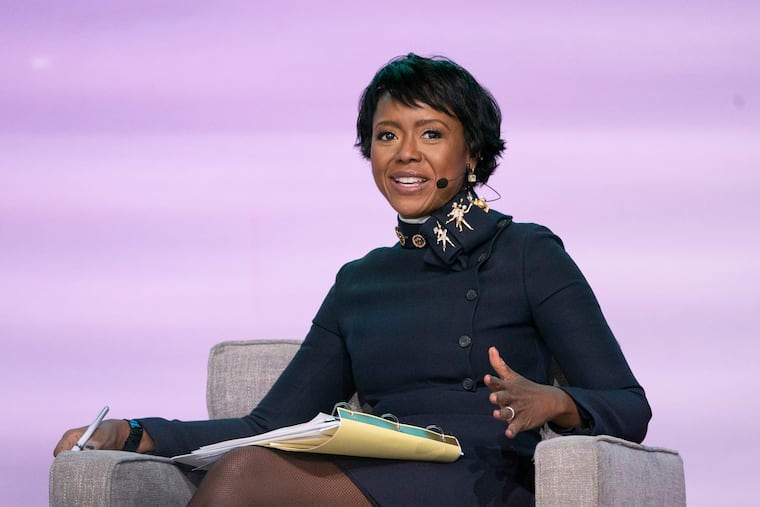Princeton to honor Black alumna Mellody Hobson at residential college once named for Woodrow Wilson
The move carries symbolic heft, closing a long-running debate on the campus over Wilson's legacy and racist beliefs.

Princeton University will replace a residential college that once honored Woodrow Wilson for a new one to be named for a Black alumna: Ariel Investments co-CEO and philanthropist Mellody Hobson.
The move carries symbolic heft, closing a long-running debate on the campus over Wilson's legacy and racist beliefs.
Hobson recalled arriving at Princeton as a student, the first in her immediate family to attend college, and seeing buildings carrying names such as Rockefeller and Forbes. But she immediately felt at home, she said, and people were welcoming to her and her ideas. "I felt like I belonged," she said Wednesday by phone.
When future generations of students, especially those who are Black or Brown, see Hobson College, "I want them to think, 'I belong here,'" she said.
Hobson and the Hobson/Lucas Family Foundation gave the lead gift for the residential college. She and her husband, filmmaker George Lucas, were awarded the Carnegie Medal of Philanthropy in 2019 for efforts including the Lucas Museum of Narrative Art, and the After School Matters nonprofit helping teens in Chicago.
Hobson College is tentatively scheduled to open in the fall of 2026.
The residential colleges help build communities within the school, Hobson said. "Your college is the first place that binds you to Princeton." It's also students' home, she said, "and home is important."
Hobson was honored by the university in 2019 with a Woodrow Wilson Award, and said at the time it was strange to receive an award named for someone who would not have been welcoming to her. "Despite the school's colors, President Wilson failed to see that orange and black belong together," she said then.
"This extraordinary gift will be transformative for Princeton," the university's president, Christopher L. Eisgruber, said in a statement. "It will enable us to improve the student experience at Princeton and to reimagine a central part of our campus, while also recognizing a remarkable woman who is a positive, powerful force for change in the world."
The university's leaders had considered removing Wilson's name from campus buildings after student protesters demanded change in 2015, but declined to do so the following year even as they committed to better reflect the complexities of his legacy.
In June, amid a national reckoning over racial injustice and calls from many at Princeton, Eisgruber told campus that the board of trustees had decided to rename Wilson College and the School of Public and International Affairs, because "trustees concluded that Woodrow Wilson's racist thinking and policies make him an inappropriate namesake."
Wilson is different than Confederate leaders or people famous for their defense of slavery, Eisgruber wrote. "Princeton honored Wilson not because of, but without regard to or perhaps even in ignorance of, his racism," he wrote. "That, however, is ultimately the problem. Princeton is part of an America that has too often disregarded, ignored, or excused racism, allowing the persistence of systems that discriminate against Black people."
Many alumni and others have long argued for keeping the name. Wilson had a significant impact on the university as Princeton's president at the beginning of the 20th century, and went on to become a two-term U.S. president and international leader during and after World War I. He was awarded the Nobel Peace Prize in 1919.
But his racist views also left their mark: He re-segregated the federal civil service after decades of integration.
President Donald Trump expressed disbelief in June at the university's decision. "Can anyone believe that Princeton just dropped the name of Woodrow Wilson from their highly respected policy center," he wrote in a tweet that also questioned another renaming. "Incredible stupidity!"
The Education Department is investigating whether Princeton is in compliance with federal anti-discrimination law, after Eisgruber made remarks in early September about combating racism on campus. Last month, more than 50 of the country's higher education associations sent a letter calling on the department to end the "misguided" investigation that could have a chilling effect on other institutions confronting their own histories. Scores of college presidents have sent a similar message.
Hobson said conversations began last year. University official's had recently asked her and her husband to donate to another cause on campus and they had declined. But Princeton returned with another request — the offer to rename the college. "We didn't sit on it for an hour," she said. "We said yes. It's an important statement for future generations, especially Black and Brown students that go to Princeton."
Notwithstanding Wilson’s role as president of the United States, an office she respects, Hobson said he made some very clear, bold statements about his beliefs around race, she said. “Those are in conflict with the underlying values of the university — especially today.”
“The idea that you could remove that was compelling to me,” she said. It wasn’t about her name, she said, but the symbolism of a Black woman taking the place of those values. That felt poetic and personal and very significant, she said.